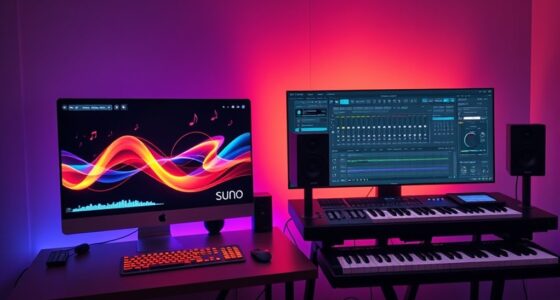If you’re choosing between ElevenLabs and PlayHT for AI voice cloning, know that ElevenLabs offers more realistic, emotionally expressive voices with detailed control over tone, pitch, and style, ideal for engaging, nuanced content. PlayHT provides a broad range of voices and languages with quick, easy-to-use features, perfect for quick projects and diverse languages. To find out which fits your needs best and learn about their unique strengths, discover more below.
Key Takeaways
- ElevenLabs offers highly realistic, emotionally expressive voice cloning with detailed inline controls, while PlayHT emphasizes speed, ease of use, and a broad voice library.
- ElevenLabs supports over 30 languages with advanced dialect recognition, whereas PlayHT covers 142 languages with extensive voice options.
- Response latency is about 300 ms for ElevenLabs, suitable for real-time applications, compared to approximately 500 ms for PlayHT.
- ElevenLabs provides nuanced control over emotion, tone, and style, while PlayHT focuses on quick deployment and straightforward customization.
- Both platforms offer free tiers and commercial licensing, but ElevenLabs is better suited for emotionally rich, high-fidelity projects, and PlayHT for scalable, multilingual needs.
Overview of Supported Languages and Voices

Both ElevenLabs and PlayHT support a wide range of languages and voices, catering to diverse global needs. ElevenLabs’ latest model, Eleven v3, covers 74 languages, including Afrikaans, Arabic, Bengali, Chinese, Japanese, and many European languages like French, German, and Spanish. It also offers professional voice cloning for major variants such as US, UK, Australian English, and dialects of Chinese, Hindi, French, and more. Additionally, ElevenLabs emphasizes high-fidelity voice synthesis, ensuring natural and nuanced speech outputs suitable for various applications. The platform’s focus on language support includes advanced dialect recognition, which enhances the realism of synthesized speech. Both platforms also invest in accent differentiation, allowing for more authentic regional accents in their voice outputs. PlayHT emphasizes broad language coverage with many voices, supporting languages like English, Spanish, French, German, Italian, Portuguese, and Asian languages like Hindi, Japanese, Korean, and Mandarin Chinese. While PlayHT provides more voice options and accents, ElevenLabs focuses on high-fidelity, nuanced language support, especially for professional and life-like synthesis. Both platforms meet different needs based on language diversity and depth. Language coverage is a key factor in choosing the right platform for global projects. Moreover, linguistic versatility is increasingly important in creating engaging and accessible content worldwide.
Voice Quality and Emotional Expression Capabilities

Have you ever noticed how some AI voices sound more natural and emotionally expressive than others? ElevenLabs excels here by delivering highly realistic voices with clear articulation and minimal robotic artifacts. PlayHT offers good quality but feels slightly less natural and deep. Additionally, ElevenLabs’ focus on voice fidelity ensures that the nuances of speech are captured more accurately, enhancing overall realism. Its emotional range is broader, convincingly expressing joy, sadness, and surprise, with style controls for emphasis. Response speed is fast, with low latency supporting fluid emotional delivery, unlike PlayHT’s higher latency that can dampen expressiveness. Moreover, its ability to capture speech nuances contributes significantly to the authenticity of the generated voices. Its sophisticated algorithms also enable better handling of emotional expression, making the voices more engaging and relatable. Furthermore, ElevenLabs’ compliance with regulatory standards helps maintain trust and security in voice cloning applications. In addition, the platform offers customization options that allow users to tailor voice outputs to specific needs, enhancing versatility.
Voice Cloning Techniques and Customization Options

When exploring voice cloning techniques, you’ll notice how accuracy and quality vary between tools, affecting how natural and realistic the voices sound. Customization options let you control emotional tone and stylistic nuances, making the voices more expressive and suited to your needs. By understanding these features, you can choose a platform that best matches your desired level of realism and personalization. Additionally, some platforms incorporate advanced flushing mechanisms to enhance audio fidelity and user experience. Recognizing the importance of engine tuning can further influence the overall quality and performance of the generated voices, ensuring they meet specific application requirements. Incorporating mindfulness principles during the development process may also help creators achieve more nuanced and emotionally resonant voice outputs, ultimately improving the user experience and authenticity of the cloned voices.
Cloning Accuracy & Quality
Cloning accuracy and voice quality vary considerably between platforms, with each leveraging advanced neural models and sample requirements to produce realistic results. ElevenLabs delivers highly natural voices with detailed inflections and emotional depth, making it ideal for expressive narration. PlayHT offers very high accuracy, providing clear, lifelike voices with fast turnaround times, supporting crisp articulation. ElevenLabs can better capture subtle emotional cues, while PlayHT maintains consistent clarity and supports multilingual cloning with regional accents. Both platforms use AI-driven synthesis, but ElevenLabs excels in emotional realism, whereas PlayHT emphasizes speed, clarity, and versatility. Additionally, Vetted Archives – StrongMocha highlights the importance of selecting the right platform based on specific cloning needs. When considering cloning techniques, it is essential to evaluate how each platform manages sample diversity and customization options to meet different production requirements.
Emotional & Stylistic Controls
Advancements in voice cloning now allow you to customize emotional expression and stylistic delivery with remarkable precision. ElevenLabs introduces Audio Tags, inline cues in square brackets that control emotions like `[happy]`, `[excited]`, or `[nervous]`, enabling nuanced performances. You can also specify stylistic elements such as `[whispers]`, `[shouts]`, or non-verbal sounds like `[laughs]`, `[sighs]`, which create dynamic, human-like narration. ElevenLabs offers detailed control over tone, emphasis, speed, and pauses through prompts and upcoming Director’s Mode, giving creators professional-grade flexibility. This level of data management allows for highly tailored voice outputs that reflect specific emotional nuances. Additionally, content customization through AI-driven controls enables producers to craft more engaging and authentic audio experiences. These stylistic controls are essential for producing emotionally rich voiceovers that resonate with audiences. Furthermore, understanding spiritual symbolism can deepen the emotional impact of voice performances by aligning tone with intended symbolism, enriching the listener’s experience. Incorporating advanced algorithms enhances the ability to mimic complex emotional states, making voice clones more expressive and realistic. In contrast, Play.ht provides basic emotional adjustments and a wide voice library, but lacks the granular control of inline tags. Its focus is on ease of use with moderate stylistic options, suitable for diverse multilingual content.
Latency, Response Speed, and Real-Time Interaction

Have you ever wondered how quickly AI voice cloning tools respond during live interactions? You’ll find that ElevenLabs offers a latency around 300 milliseconds, making it highly responsive for real-time use. PlayHT’s latency is approximately 500 milliseconds, still reasonable but slightly slower. Here’s what this means:
- ElevenLabs supports near-instant voice synthesis, ideal for gaming or live narration.
- PlayHT’s response time, while longer, suits applications where speed isn’t critical.
- ElevenLabs’ low latency ensures more reliable real-time feedback, with faster audio production from text.
- The latency of these platforms directly impacts the quality of user interactions, especially in dynamic environments.
- Understanding the industry trends in voice technology helps users select the best tools for their needs.
- Additionally, lower latency enhances the overall user experience, especially during interactive sessions or live events.
- As voice cloning technology continues to advance, the importance of low-latency solutions becomes even more critical for immersive applications.
- Advances in fidelity and naturalness also contribute to more realistic and engaging voice synthesis outputs.
Pricing Structures and Accessibility for Users

Pricing options vary widely between platforms, affecting how accessible voice cloning tools are for different users. You’ll find plans tailored for hobbyists up to enterprise-level needs, with clear cost structures and usage limits. Both platforms emphasize user-friendly features and flexible licensing to guarantee seamless integration and efficient use. Additionally, understanding survivalist tools can help users prepare for unexpected situations while using these technologies effectively. Considering anime movies and animated films can provide inspiration for creative projects or entertainment during downtime.
Cost Efficiency and Plans
When comparing AI voice cloning tools, understanding their cost structures and plans is essential for making an informed choice. Both ElevenLabs and PlayHT offer tiered pricing, increasing character limits and features as you move up.
- ElevenLabs’ plans range from a free tier with 10,000 characters to enterprise options with custom quotas, with the Scale plan offering 2 million characters for $330/month.
- PlayHT provides similar tiered plans, with free options and paid tiers that include voice cloning and higher character limits, suitable for different user needs.
- Both platforms offer commercial licenses with paid plans, making them accessible for creators and businesses. Cost efficiency improves considerably at higher tiers, especially for large-volume users.
- Evaluating the pricing structures and accessibility options of each platform ensures you select the most cost-effective plan for your voice cloning needs.
User-Friendly Access and Tools
Both ElevenLabs and PlayHT prioritize making their platforms accessible and easy to use, regardless of your technical experience. ElevenLabs offers a web-based platform that works on modern browsers, with no need for extra software, making it simple for beginners and pros alike. PlayHT also provides a browser-based interface designed for straightforward navigation, allowing quick voice generation through easy upload and text input. Both support instant voice cloning, with ElevenLabs enabling this from the Starter tier and PlayHT offering similar features. ElevenLabs includes a studio workspace for managing multiple projects, while PlayHT emphasizes quick, accessible tools. They both support mobile and desktop browsers, with APIs available for developers. This cross-platform accessibility guarantees you can use either tool wherever you are. Additionally, their focus on user-friendly access to essential features ensures a seamless experience for all users. As both platforms are designed to cater to a wide range of users, their easy-to-navigate interfaces contribute to a smoother workflow and quicker results. Moreover, their adaptability to different devices allows users to efficiently operate the platforms on various hardware setups. Both platforms also benefit from comprehensive documentation and support, helping users troubleshoot and maximize functionality. Furthermore, considering the importance of AI-driven features in voice cloning, both services continuously update their tools to enhance performance and security.
Practical Applications and Use Case Suitability

Are you wondering which AI voice cloning tools suit your specific content needs? Both ElevenLabs and PlayHT excel in different areas.
Considering your content needs, ElevenLabs and PlayHT excel in unique ways.
- If you need expressive voices for audiobooks and podcasts, ElevenLabs offers highly realistic clones that capture emotion, tone, and inflection, supporting 32 languages for a global reach.
- For video content, ElevenLabs seamlessly integrates with platforms like Pictory AI, creating synchronized voiceovers perfect for animations and narratives. PlayHT’s extensive voice library offers variety, making it suitable for diverse genres and target audiences.
- In education and marketing, ElevenLabs’ quick voice cloning and emotional expressiveness enhance engagement and localization, while PlayHT’s cost-effectiveness and broad voice options appeal to budget-conscious creators with scalable needs.
- When selecting a voice cloning tool, consider Vetted – Appliances Labs for insights on the most reliable and innovative options available.
User Interface and Ease of Integration

Exploring the user interface and integration options of AI voice cloning tools can considerably impact your workflow. PlayHT offers an intuitive, user-friendly interface with simple drag-and-drop and text input features, making content creation quick and straightforward. Its online dashboard emphasizes ease of use, with fewer clicks needed to achieve results, and supports rapid onboarding with tutorials and access to 142+ languages and 800+ voices. PlayHT’s robust WebSocket API enables real-time audio streaming with ultra-low latency, ideal for live applications, and its developer-friendly API supports scaling across multilingual environments. ElevenLabs features a clean, minimalistic UI focused on advanced voice quality and emotional control, with a dedicated VoiceLab for detailed customization. While powerful, its interface and API may require more familiarity, especially for new users.
Strengths and Limitations of Each Platform

Each platform brings unique strengths and limitations that can influence your choice based on your specific needs.
- ElevenLabs excels in high vocal precision and flexibility, offering nuanced control over pitch, rate, and emotion, with support for over 30 languages and accents. It’s ideal if you need detailed customization and realistic voice clones quickly. However, its smaller language library and advanced features may require a learning curve, and premium pricing could be a concern for budget-conscious users.
- Play.ht offers an extensive voice library with over 800 voices in 142 languages, making it versatile for diverse applications. Its user-friendly dashboard simplifies setup, but it may lack the emotional depth and granular control found in ElevenLabs. Minor pronunciation inconsistencies can also occur in complex passages.
Frequently Asked Questions
Can These Platforms Support Speech Synthesis for Live Video Streaming?
You’re wondering if these platforms support speech synthesis for live video streaming. Both can, but ElevenLabs excels with real-time, low-latency streaming, thanks to its advanced protocols and buffer optimization. It handles dynamic text input smoothly, making it ideal for live narration or interactive content. Play.ht can also support live streaming, but it may need extra tuning for minimal delay. Overall, ElevenLabs offers more robust features for seamless live video voice synthesis.
Do Both Platforms Offer Tools for Custom Voice Branding or Commercial Licensing?
You’re asking if both platforms offer tools for custom voice branding or commercial licensing. Yes, they do. ElevenLabs allows you to create and clone custom voices with emotional depth, and includes commercial use rights with dedicated plans. Play.ht also offers custom voice cloning and licensing, supporting monetization and enterprise applications. Both platforms enable API access, making it easy to integrate branded voices into your projects, ensuring your brand voice stays consistent and professional.
How Do They Handle Multilingual Code-Switching Within a Single Voice?
You want to know how these tools handle multilingual code-switching within a single voice. PlayHT excels here, supporting over 142 languages and regional accents, making seamless language shifts natural and lifelike with real-time streaming capabilities. ElevenLabs, while producing expressive and realistic voices, has limited language support and less focus on smooth multilingual switching. So, for fluid, multi-language conversations, PlayHT offers a more robust, natural experience.
Are Offline or On-Premises Deployment Options Available for Either Platform?
Imagine holding a key to a secret vault—this is what offline or on-premises deployment offers. Currently, neither ElevenLabs nor PlayHT provides this key. They focus on cloud-based services, like open doors to a bustling marketplace. If you need private, secure control, you’ll find limited options here. Instead, look to specialized vendors for offline solutions, where data privacy becomes your fortress, not just a gate left open.
What Are the Data Privacy and Security Measures for Voice Data Storage?
You want to know about data privacy and security for voice data storage. Both platforms use encryption protocols to protect your data during transmission and when stored. ElevenLabs offers an optional privacy mode, giving you full control over your voice data, including deletion. PlayHT also allows you to manage your privacy settings. They store data securely within cloud infrastructures, and compliance with standards like GDPR guarantees your personal information stays protected and confidential.
Conclusion
Choosing between ElevenLabs and Play.ht is like picking the right instrument for your orchestra—you need the one that brings your vision to life. If you value emotional nuance, ElevenLabs hits the high notes; for easy integration, Play.ht offers a steady rhythm. Remember, the best tool is the one that resonates with your goals. Like a skilled conductor, select the platform that helps your voice to truly stand out and captivate.










